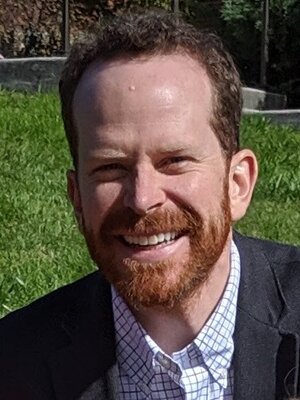
Robert Erle Barham
Creative Nonfiction
Robert Erle Barham is an English professor at Covenant College, and he lives with his family in Chattanooga, Tennessee. His work has appeared in Appalachian Review and River Teeth’s “Beautiful Things” series, and it is forthcoming in The Florida Review and Fourth Genre.
Small as This
"Tell me a story," my son says.
It begins: “Once upon a time, when your dad was a teenager, he and two friends were riding the backroads of North Louisiana near their hometown. It was the first day of summer, and we were going too fast down a gravel road. Dan was driving. I was in the front, and Benjamin was in the back. None of us were wearing seatbelts. As we rounded a curve, the car lost traction, and we hit a ditch. The car flipped and landed in a smoking heap facing the other direction. Miraculously nobody was hurt—except Benjamin who had a tiny scratch on his cheek."
"Small as this?" my son asks, holding his fingers close together.
"Smaller than that," I say. "Then we had to walk miles and miles, all the way back to town.”
I tell it flat and not too scary, emphasizing the wonder of our safety. My son gets the moral when he repeats the tale to his mother—“They were driving too fast!”—and he stresses how small Ben’s scratch was.
Here’s what I leave out. The adolescent restlessness that prompted our drive; the violent, disorienting tumble through the car as it rolled; afterwards, the scramble to pick up our cigarettes scattered along the road. I also omit details like the grind of the gravel under our tennis shoes and the thick Louisiana heat as we walked home; my father’s buckling knees when he heard what happened.
I don’t tell my son that this story makes the past seem easily legible and that it always recalls Benjamin, years later, when I had just moved back to town. I saw him and we laughed like we were kids again. “Come ride with me sometime; I’d love to catch up,” he said. I don’t tell my son that a week later, Benjamin, who was always charming and funny and full of mirth, took his own life and left behind friends and family groping to understand his final state of mind.
These stories—the one I tell my son and the one I don’t—are about possibilities, contingencies. What if we had been driving faster? What if one of us had been thrown from the car? What if?
And what if I had gone on that ride with Benjamin? We might have driven the very same road we did as teenagers, and we might have talked about the wreck and other near misses. We might have been so caught up in reminiscence that we ran out of gas and had to walk back to town, laughing at the irony. Along the way, Ben might have confided in me, might have mentioned some isolating sadness. He might even have been consoled by our conversation, just speaking his sorrow out loud, words enough to tame the demons. After we refueled his truck and parted, he might have smiled and waved, and then driven away. Without a scratch.
“ When my son asked for a story, I was struck by the symmetry of the moment, telling a story to someone I love about someone I miss. The structure of moving between the present and past, between things said and unsaid, called this essay to mind. ”
